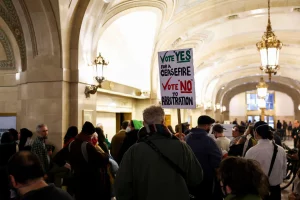photo by Karolina Grabowska
Many workers will see a pay increase this year in Illinois as the Senate Bill Gov. Pritzker signed into law in 2019 continues its gradual increase year by year. The bill was a success partly through Pritzker’s progressive policies, but mostly by the hard work of activists within the Fight for $15 movement.
“When fast-food workers in Chicago first joined the Fight for $15 more than four years ago, nobody believed we would get this far,” Fight for 15 said. “But we didn’t have a choice – we knew $15/hour was what we needed to survive. Now, by joining together with other underpaid workers, speaking out, and going on strike, we’re closer than ever to winning $15/hour for 2.3 million workers in the state.”
The last time Illinois increased its minimum wage was more than a decade ago in 2010 when it was raised to $8.25. Cook County has a higher minimum wage than the state, currently $13 an hour. The current city of Chicago minimum wage is $13.50 an hour for small employers (4 to 20 employees) and $14 an hour for large employers (21 or more employees).
Tipped employees may be paid 60 percent of the hourly minimum wage. These workers must still earn the minimum wage after receiving tips or the employer must make up the difference.
In comparison to other state’s, Illinois’ metric of $15/hr by 2025 is a tad slow. Many states are also implementing the year over year growth approach, like California and Massachussetts, but will hit $15/hr in 2022 and 2023, respectively.
This is better than states like New York, for example, whose minimum wage laws are tied to inflation.
Again, this push has been led and will continue to be led by the hard work of activists like the Fight for 15 movement. Their movement began in 2012 when 200 fast food workers walked off the job in New York City, and their strategies that demand the value of their work be recognized has meaningfully brought the conversation of wage to the table.
“The ultimate dream is to get McDonald’s, Wendy’s and Burger King to a national fast food bargaining table,” said international SEIU president Mary Kay Henry in interview with the Chicago Tribune. “We could reach a private agreement and that could cover a million fast food workers, but it could impact 4 million fast food workers” by setting industry standards.












Be First to Comment